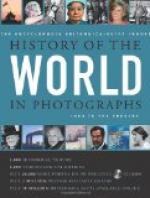Fishery Law.—G.C. Oke, A Handy Book of the Fishery Laws (edited by J.W. Willis Band and A.C. M’Barnet, London, 1903).
ANGLO-ISRAELITE THEORY, the contention that the British people in the United Kingdom, its colonies, and the United States, are the racial descendants of the “ten tribes” forming the kingdom of Israel, large numbers of whom were deported by Sargon king of Assyria on the fall of Samaria in 721 B.C. The theory (which is fully set forth in a book called Philo-Israel) rests on premises which are deemed by scholars—both theological and anthropological—to be utterly unsound.
ANGLO-NORMAN LITERATURE:—The French language (q.v.) came over to England with William the Conqueror. During the whole of the 12th century it shared with Latin the distinction of being the literary language of England, and it was in use at the court until the 14th century. It was not until the reign of Henry IV. that English became the native tongue of the kings of England. After the loss of the French provinces, schools for the teaching of French were established in England, among the most celebrated of which we may quote that of Marlborough. The language then underwent certain changes which gradually distinguished it from the French spoken in France; but, except for some graphical characteristics, from which certain rules of pronunciation are to be inferred, the changes to which the language was subjected were the individual modifications of the various authors, so that, while we may still speak of Anglo-Norman writers,




